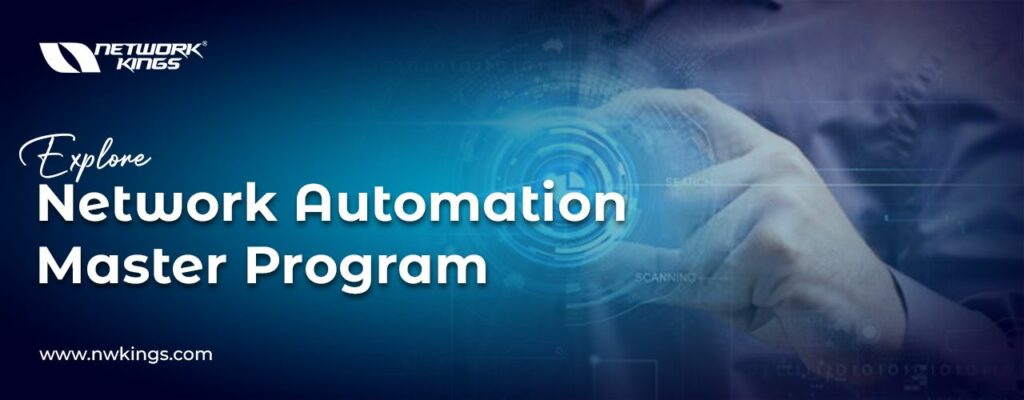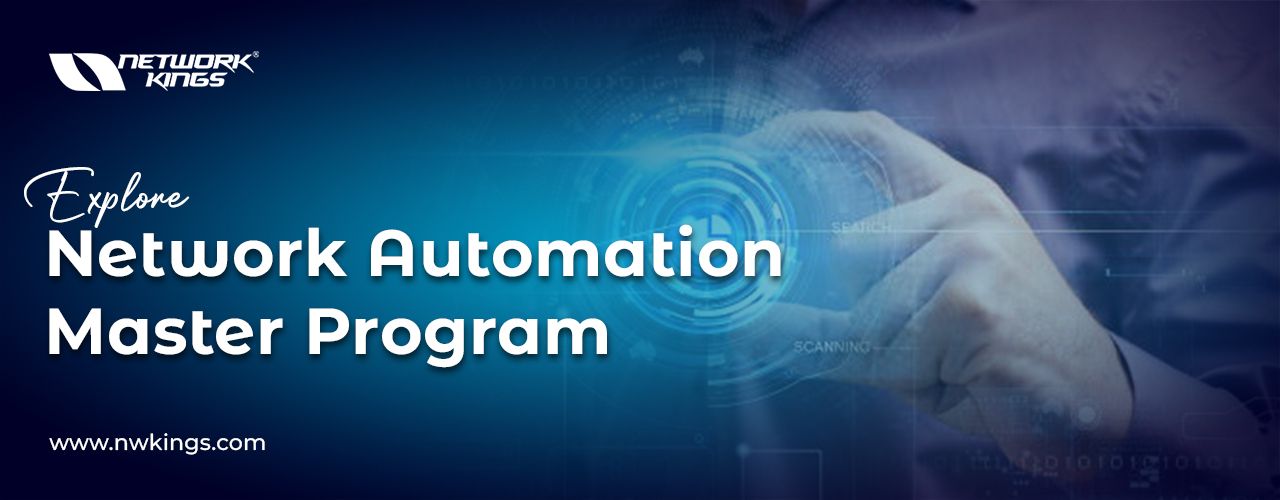
Network Automation Master Program is a combination of three programs- Linux, Python, and SD-WAN. This program by Network Kings is for students to save time and gain knowledge. The Network Automation course provides basic to advanced levels of learning.
Learn about this program in the blog!
What is the Network Automation Master Program?
The Network Automation Engineer program offers the skills and knowledge to streamline and optimize network operations through task automation and processes, leading to increased efficiency, scalability, and cost-effectiveness in network management.
It consists of three courses: Linux, Python, and SD-WAN.
Note: Click here to check the Network Automation Master program brochure.
What are the benefits of a Network Automation Program?
Here are the benefits of the Network Automation Program:
Handsome Salary
The Network Automation Master Program offers an average salary of 20+ LPA.
Job opportunities
This field has 50,000+ job vacancies.
Efficiency and Productivity
Network automation facilitates duplicative and time-consuming tasks, like device formatting, provisioning, and troubleshooting. It liberates network engineers‘ time to concentrate on more strategic and demanding tasks, eventually improving overall productivity.
Decreased Human Error
Automation lowers the chance of human errors, which can lead to network outages or safety exposures. Automated methods follow predefined rules and best methods consistently, minimizing the possibility of blunders.
More rapid Deployment
Automation can greatly accelerate the deployment of network services and compositions. It is crucial in dynamic environments where quick transformation to altering conditions is vital.
Enhanced Scalability
Automated networks are more leisurely to scale because adding new devices or services can be performed more efficiently. It is necessary for communities undergoing transition or changes in network demands.
Improved Reliability
Automated systems can constantly scan network health and react to problems in real-time. They can also implement constant layouts, directing to a more durable and dependable network environment.
Cost Conserving
By decreasing the manual action directed at network management and troubleshooting, institutions can save on labour costs. Additionally, automation can help optimize network resource utilization, potentially reducing hardware and bandwidth fees.
Consistency and Compliance
Network automation ensures that designs and procedures are applied across the network. It is vital for supporting adherence to industry restrictions and internal security guidelines.
Enhanced Security
Automated security standards can detect and react to dangers faster than manual intervention. One can enforce Security policies and access controls.
Skill Enhancement
Network automation training provides IT experts with practical skills in scripting, programming, and using automation tools and frameworks. These skills are increasingly in demand in the job market.
Competitive Advantage
Organizations can earn a competitive advantage with network automation. It offers more elegant, efficient, and dependable services to customers.
Transformation to Cloud and SDN
Network automation is vital in cloud computing and Software-Defined Networking (SDN) environments, allowing the dynamic provisioning and management of resources.
DevOps Integration
Network automation aligns with DevOps principles, promoting cooperation between network and software teams, and facilitating continuous integration and delivery (CI/CD) pipelines.
Career Growth
Experts with network automation skills are often sought after and can expand their careers more rapidly. These skills are relevant in different roles, including network engineer, network architect, and DevOps engineer.
What are the top skills in the Network Automation Course Program?
The top skills you will learn with the Network Automation course are:
- Understanding and using essential tools
- Create simple shell scripts
- Operate Running systems
- Configure local storage
- Create and configure the file system
- Manage basic networking
- Manage users and groups
- Manage groups
- Manage Containers
- Network automation
- Network analysis
- Network device management
- Scripting and tool development
- API integration
- Data visualization
- Security automation
- Cloud network management
- Architecture
- Controller Deployment
- Router Deployment
- Policies
- Quality of Service and Security
- Management and Operations
What are the roles and responsibilities of the Network Automation Engineer?
The roles and responsibilities of the Network Automation Engineer are:
- Plan, create, scale and automate the highly scalable Microsoft global WAN and Optical network.
- Automate the build-up procedure to frame the composition and safely push it to the devices.
- Estimate the triumph of automation against the key arrangement indicators to enhance the layout quality and cycle time.
- Endorse creation and cost surveillance by critically estimating current practices and devising tools that satisfy the business requirements linked to rank, agile and protection.
- Lead plan, network/code testing and safety checks across teams to recognize threats and thwart classes of bugs before production escape by laying expertise in network implementation, available technologies, research of telemetry pipelines, root cause investigation, and most promising approaches in determining and executing solutions.
- Work in alliance with squads across organizations to create dependable, scalable, and high-performance network designs; independently assemble design documents and enactment plans.
- A Network Automation engineer prioritizes, mitigates, and amends intricate live site issues by applying expertise in physical network parts, features, and risk control means like root cause analysis, trend examination, postmortems, and repair items.
- Partakes in on-call/DRI tasks to fix happenings in production and directs other engineers on triage, troubleshooting, and answering processes.
- Unite within and across teams by proactively sharing information with suitable details for their target audience.
- Overpower barriers by settling disputes and problems across interdependent teams and engaging with members and stakeholders to resolve issues and meet joint objectives.
- Exhort the best network engineering techniques and methods within and across the group.
What are the prerequisites of Network Automation Engineering?
The prerequisites of the Network Automation Program are:
- Fundamental understanding of the WAN
- 1-2 years of background in IT Networking
- Basic knowledge of Software-Defined Networks
- Understanding of Routing protocols
- Knowledge of Transport Layer Security (TLS) and IP Security
- Graduation is necessary.
- Basic understanding of the IT industry
- Elemental understanding of IT Networking
- Essential knowledge of TCP/IP
- Basic understanding of Python
- Introduction to Database Programming (Preferred)
- Fundamental knowledge of Network Management
What are the top Network Automation certifications?
The top certifications in the Network Automation Program are:
How to become a Network Automation Engineer?
To become a Network Automation Engineer, one needs at least 2+ years of experience in Software Engineering, high-level programming knowledge, understanding of Python language.
Follow these steps to become a Network Automation Engineer:
-
Learn networking basics
Start with networking basics, like gaining knowledge in OSI model, TCP/IP, routing, switching, VLANs, and subnetting, and get certification of CompTIA Network+ or Cisco’s CCNA.
-
Programming and Scripting language
Get hands-on programming and scripting language, so start with Python.
-
Network Protocols and APIs
Learn protocols and APIs like SNMP, REST APIs, and NETCONF. It will enhance your knowledge and will help you build your resume strong.
-
Networking Equipment
There are various networking equipment, like routers, switches, firewalls, and load balancers.
-
Tools
In the modern era, we do every work with the help of tools, and learning tools is crucial to use them.
-
Versions Control Systems
To manage your automation scripts and code, you must know how to use Git.
-
Containerization and Orchestration
Learn orchestration and containerization techniques with Kubernetes and Docker respectively.
-
Network Monitoring and Management Platforms
Get familiar with some network monitoring tools to manage the network properly.
-
Cybersecurity Grasp
To handle networking, you must check the security of your networking. Hence, keeping cybersecurity knowledge is vital.
-
Lab Experiment
Experiment with your knowledge with lab practice because it is crucial to have practical knowledge rather than just theoretical.
-
Certifications
Earn certifications like Cisco’s DevNet Associate and Professional or Red Hat Certified Engineer (RHCE) as it adds value to your resume.
-
Create a portfolio
Create a portfolio with the help of your work experience. Compiling your work history in one place will make it easy for you to provide your work experience.
-
Apply for Jobs
After you are ready with your portfolio, apply for the desired jobs.
Where can we pursue a Network Automation Master Program?
You can pursue the Network Automation Master Program from Network Kings, as it offers various benefits. Before discussing the benefits, let us discuss the details of the course mentioned:
Linux: Linux certification is one of the best open-source operating systems teaching the Red Hat Linux syllabus. The Linux Certification course prepares Linux Installation, Administration, Configuration, Troubleshooting, and Operating System tools. Linux training also enables to write Shell scripts and command lines.
Here are the exam details of RHCSA Linux training:
Exam Name Red Hat Certified System Administrator (RHCSA) exam
Exam Code EX200
Exam Cost USD 400
Exam Format Lab-based practical questions
Total Questions 20-25 questions
Passing Score 210/300
Exam Duration 150 minutes
Languages English, Japanese, Korean, and Simplified Chinese
Testing Center Pearson VUE
Here are the exam details for RHCE Linux Training:
Three exams for RHCE specify different versions of the Red Hat Linux. These are as follows:
EX294: This exam is based on Red Hat Enterprise Linux 8 (RHEL 8). This exam covers topics such as security, storage management, networking, system administration, and automation using Ansible.
Exam Name Red Hat Certified Engineer (RHCE)
Exam Code EX294
Exam Cost USD 400
Exam Format Performance-based questions
Total Questions 15-20 questions
Passing Score 210/300
Exam Duration 4 hours
Languages English, Japanese, Korean, and Simplified Chinese
Testing Center Pearson VUE
Here are the benefits of pursuing the Network Automation Master Program with Network Kings:
- You can get three courses in one subscription with our master’s program.
- You can learn from industry experts in the Network Kings.
- Experience real-world simulations to become job-ready.
- Get 24×7 access to labs to learn at your convenience.
- Access virtually from any part of the world.
- Zero downtime.
- Industry-oriented training.
- Choose from Hindi and English.
- All-time Assistance.
- 24/7 availability to answer your queries.
- Revised Syllabus
- Most delinquent resources to learn from
- Hands-on Experience
- Training with virtual labs
- Earn a completion certificate.
Python training:
The Python for Network Engineers course is created for Network Engineers to know Python course and other conditions of Automation skills utilising Python Programming Language to address Networks and Devices. Python for Network Engineers training deals with the process of Automate tasks on Routers and Switches using Python. With a proper command of Networking coupled with Python training, one can automate networking tasks.
SD-WAN Training:
The SD-WAN Certification helps in boosting talents and understanding concerning in-depth networking. The Software-Defined Wide Area Network or SD-WAN course creates expertise in preparing, nestling, arranging, and ordering SD-WAN solutions in wide networks in a short span of time. The Cisco SD-WAN training Certification also prepares the SD-WAN structure and migration, arrangement of controllers, deploying and returning edge devices, and the ways to configure Direct Internet Access (DIA).
Here are the exam details for SD-WAN training:
Exam Code SDWAN 300-415 ENSDWI
Exam Level Associate
Exam Cost $300
Exam Duration 90 Minutes
Exam Format MCQ & Multiple Response
Total Question 55-65 Questions
Passing score Variable (750-850 / 1000 Approx.)
Language English & Japanese
What are the top job roles' after pursuing the Network Automation Program?
Top Job roles after pursuing the Network Automation course are:
- Network Automation Engineer
- Sr. Network Automation Engineer
- Software Engineer- Network Automation + DevOps
- Python/ Perl Developer
- Automation Programmer
- Network Automation Tester
- Senior Specialist with Network Automation Development
- L3 Network Engineer
- Network Engineer Architect
- Network Engineer II
- Network Infrastructure Engineer
- Software QA Engineer
- Team Lead- Network Automation
- Industrial Network Engineer
- Network Security Operations Security Engineer
- SW QA Engineer
- L2 Network Support Engineer
- L3 Network Support Engineer
- Sr. Cloud Network Engineer
- CSI- Network Engineer L6
What are the salary expectations after the Network Automation Program?
The salary expectations after the Network Automation Program are:
- United States – USD 114,32O
- Canada – CAD 78,261
- United Kingdom – £ 66,250
- Germany – € 64,817
- France – € 42,000
- United Arab Emirates – AED 1,93,200
- India – INR 4,00,000
- Japan – ¥ 61,57,047
- South Africa – ZAR 780,000
Conclusion
The Network Automation Master Program by Network Kings is for students who want to make their career in Network Automation. Network Automation Engineering has a high scope. There are various job opportunities after the Network Automation course Program, and the field also offers high-salary opportunities.




